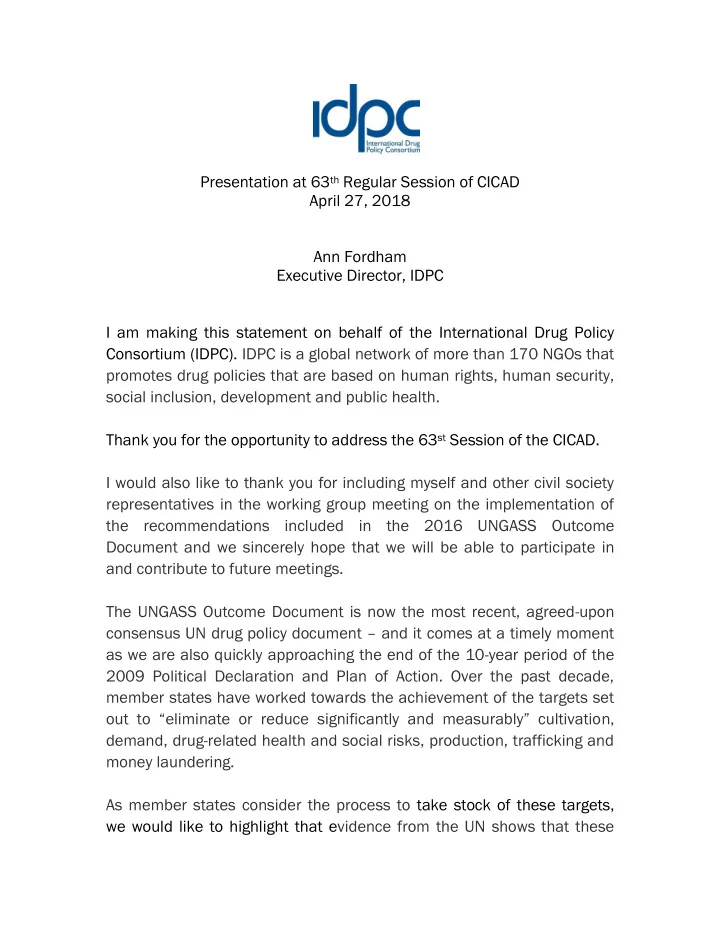

Presentation at 63 th Regular Session of CICAD April 27, 2018 Ann Fordham Executive Director, IDPC I am making this statement on behalf of the International Drug Policy Consortium (IDPC). IDPC is a global network of more than 170 NGOs that promotes drug policies that are based on human rights, human security, social inclusion, development and public health. Thank you for the opportunity to address the 63 st Session of the CICAD. I would also like to thank you for including myself and other civil society representatives in the working group meeting on the implementation of the recommendations included in the 2016 UNGASS Outcome Document and we sincerely hope that we will be able to participate in and contribute to future meetings. The UNGASS Outcome Document is now the most recent, agreed-upon consensus UN drug policy document – and it comes at a timely moment as we are also quickly approaching the end of the 10-year period of the 2009 Political Declaration and Plan of Action. Over the past decade, member states have worked towards the achievement of the targets set out to “eliminate or reduce significantly and measurably” cultivatio n, demand, drug-related health and social risks, production, trafficking and money laundering. As member states consider the process to take stock of these targets, we would like to highlight that evidence from the UN shows that these
targets are unachievable. The UNODC itself, states in the 2017 World Drug Report that the ‘drug market is thriving’. In addition, to this clear lack of progress towards the 2009 goals in the last decade, we can no longer ignore the devastating negative impacts that have resulted from misguided drug policies. 2008 is also the 10-year anniversary of the former UNODC Executive Director’s 2008 report on ‘Making drug control fit for purpose’. The ‘unintended consequences’ which were identified then are still relevant today, and little progress has been made to address them. These negative consequences are directly related to the focus on achieving a drug-free society, as promoted in the 2009 Political Declaration and Plan of Action on drugs. For example, during this last decade we have failed to adequately address the HIV epidemic among people who inject drugs. The UN target to reduce by 50% new HIV infections among this population by 2015 was missed by a wide margin. In addition, in the last few years, there has been an alarming and unprecedented rise in the number of people dying from overdoses relating to the use of opioids. It is well documented that criminal punishment for drug use fuels these significant health harms faced by people who use drugs. In parallel, the last decade is marked by many devastating and concerning human rights situations, including, but not limited to: - An escalating number of extrajudicial, summary or arbitrary executions carried out in the name of drug control efforts. - Over-incarceration with millions of people all over the world being imprisoned for minor, non-violent drug-related offences. In many countries, a disproportionate share of those incarcerated is poor
and from the most marginalized groups such as women and racial or ethnic minorities. - With respect to subsistence farmers, in the absence of alternative livelihoods, forced eradication efforts deprive them of their only available means to live a life in dignity by driving them deeper into poverty. These are only a fraction of the widespread violations of human rights that have been documented in the context of drug control policies. The empirical evidence that underlines this point is extensive and damning. We welcome both the recent statement from the High Commissioner on Human Rig hts towards this end as well, and the INCB’s recent call on member states to implement international drug control conventions in accordance with their commitments to human rights treaties and the rule of law. 2019 is an important opportunity to shift the direction of drug policies. We need to look forward and build on and consolidate the progress made in the UNGASS Outcome Document. In defining the next decade in global drug control, we call on member states not to re-state unrealistic and damaging ‘drug -f ree’ targets. Such targets are used to justify widespread human rights violations, and an overly punitive approach that directly undermines health, development, peace and security. It is time to ensure that international drug control meets the broader goals of the UN, as well as contribute towards achieving the Sustainable Development Goals, that is, in the areas of public health, development, human security and ultimately human rights.
Recommend
More recommend